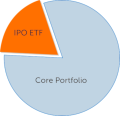
Market volatility was back this week, and IPOs either dropped out or dropped their valuations. Six companies in five different sectors raised a combined $992 million, along with one SPAC. Four of the six deals priced below the midpoint of the range, and five broke their issue price during early trading. Three companies formally postponed their IPOs and two more pushed back their offerings to next week.
Just 50% of 2018 IPOs are currently trading above issue. Helped by strong performance from several biotechs, average return this year is 12%, but aftermarket return is -0.6%.
| 7 IPOs During the Week of February 5th, 2018 | |||||
|---|---|---|---|---|---|
| Issuer Business |
Deal Size |
Market Cap at IPO |
Price vs. Midpoint |
First Day Return |
Return at 02/09 |
| Cactus (WHD) | $437M | $1,453M | 9% | +7% | +7% |
| Manufactures wellheads and pressure control equipment for US E&Ps. | |||||
| Huami (HMI) | $110M | $662M | 0% | +2% | +3% |
| Leading Chinese designer of low-cost wearable devices partnered with Xiaomi. | |||||
| Cardlytics (CDLX) | $70M | $267M | -7% | +3% | +3% |
| Provides a banking-based advertising channel to consumer products marketers. | |||||
| Mudrick Capital Acq. (MUDS.U) | $200M | $250M | 0% | n/a | +0% |
| Blank check company formed by distressed debt investor Jason Mudrick to acquire a post-bankruptcy business. | |||||
| Evolus (EOLS) | $60M | $287M | -8% | -4% | -3% |
| Preparing to launch a biosimilar version of Botox. | |||||
| Victory Capital (VCTR) | $152M | $995M | -28% | -11% | -5% |
| Multi-boutique asset management firm with $62 billion in AUM. | |||||
| Quintana (QES) | $93M | $330M | -26% | -10% | -10% |
| Provides diversified well services to onshore oil and gas E&Ps. | |||||
Sign up for a free trial of our premium platform, IPO Pro. Follow us on Twitter (@IPOtweet) and register for our updates on the IPO market.
Oil and gas wellhead provider Cactus (WHD) was the best performing deal, raising $437 million and trading up 7%. Cactus benefits from growing market share (27% of active rigs) and expanding EBITDA margins (34% in the MRQ). The positive market reception also likely reflects its differentiated offering and track record of generating positive free cash flow in down years.
After pushing its offering back by a day, Quintana Energy Services (QES) priced below the range and raised $93 million (26% less than originally intended). Despite pricing well below its peers, the well services provider traded down -10%, the worst first-day return for an energy IPO since Mammoth Energy Services (TUSK) in 2016.
Multi-boutique asset manager Victory Capital Holdings (VCTR) raised $152 million and priced at $13, a steep discount to the original $17 to $19 range. The stock then traded down -5%.
Huami (HMI), a Chinese wearables manufacturer, raised $110 million and traded flat for the week. While China’s leading fitness band provider (27% market share) targets a large and fast-growing market, Huami relies heavily on its relationship with Xiaomi, which accounted for over 80% of 9mo17 revenue.
Cardlytics (CDLX), which offers a targeted marketing platform based on consumer transaction data, raised $70 million. The first US tech IPO of the year traded up a modest 3%.
Evolus (EOLS) raised $60 million and traded down -3%. After successfully completing Phase 3 trials for its Botox biosimilar, the biotech could see approval in mid-to-late 2018. While Evolus targets a potentially large neurotoxins market, the company has a messy corporate structure, with executive and board overlap between itself and parent Alphaeon.
Bioceres, TFI Tab and IPSCO postpone; Motus and Leo push to next week
Argentine ag-tech company Bioceres (BIOX) postponed its IPO, citing market conditions. While the company has a robust pipeline of products, its chemicals business has had lumpy revenue,and its crop trait development arm is unproven.
TFI Tab Food Investments (TFIG), the exclusive franchisee for Burger King and other QSRs in Turkey and China, postponed its $220 million IPO. While the high-growth company (+42% in the 9mo17) has a strong fundamental story, boasting consistent unit and same-store sales growth, its valuation looked rich even before the market sold off.
IPSCO Tubulars (IPSC), the US subsidiary of Russian oil and gas pipe maker TMK, postponed its $500 million IPO. While IPSCO was pitched at a discount to peers, the lack of interest likely reflects the high cyclicality of its market and structural challenges such as rising US capacity and pricing pressure from importers.
Motus GI Holdings (MOTS), which is developing a medical device for intraprocedural colonoscopy cleaning, delayed its $26 million IPO to next week.
One SPAC prices, two cut deal sizes
Blank check company Mudrick Capital Acquisition (MUDS.U), led by distressed debt investor Jason Mudrick, raised $200 million. Consumer SPAC Leo Holdings (LHC.U) cut its deal size by 33% to $200 million and pushed its IPO to next week. A SPAC in the pipeline, Cerberus-backed Iron Horse Acquisition (LOU.U) cut its deal size by 40% to $300 million.
US IPO Pipeline Update
The only filing of the week, Israeli biotech PolyPid (POLY) filed to raise $86 million. Developing drugs to prevent surgical site infections, PolyPid originally filed in 2014 to raise just $20 million, but withdrew its offering in 2015.
IPO Market Snapshot
The Renaissance IPO Indices are market cap weighted baskets of newly public companies. The Renaissance IPO Index has returned -2.4% year-to-date and the S&P 500 is down -2.0%. Renaissance Capital's IPO ETF (NYSE: IPO) tracks the index, and top ETF holdings include Snap (SNAP) and Invitation Homes (INVH). The Renaissance International IPO Index is down -1.4% year-to-date, while the ACWX is down -2.3%. Renaissance Capital’s International IPO ETF (NYSE: IPOS) tracks the index, and top ETF holdings include Orsted (DONG Energy) and ASR Nederland.


